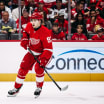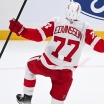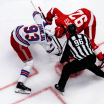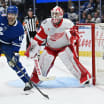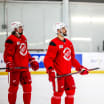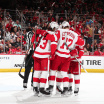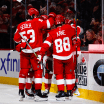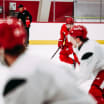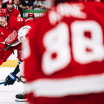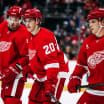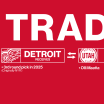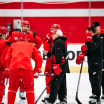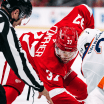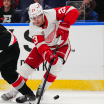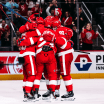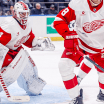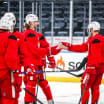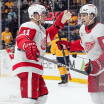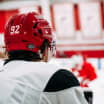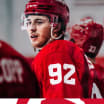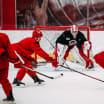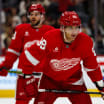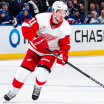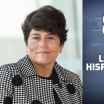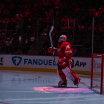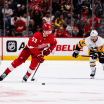Notes: Vanek to play his 1,000th NHL game versus the Predators
Mantha chomping at the bit to get back to action
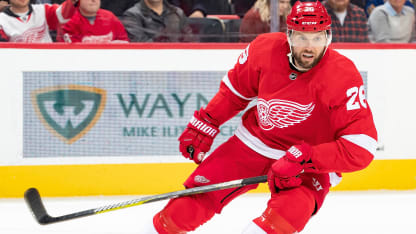
© Dave Reginek/Detroit Red Wings
Tonight against the Nashville Predators, Vanek will skate in his 1,000th career game, becoming the 332nd player in league history to reach that milestone. Vanek has 363 goals and 406 assists for 769 points in 999 games.
Vanek's Red Wings teammate, Trevor Daley, played in his 1,000th game on Dec. 23 in Toronto, beating Vanek by just five games.
"Our guys' pocketbooks are going to get hit with all these thousand games," Wings coach Jeff Blashill joked. "It's awesome. Listen, you play 1,000 games in the National Hockey League, there's a reason why it's a big measuring stick. It's a hard thing to get to. You have to have longevity in your career. There's a lot of guys in this league that are good for periods of time, but to be that good to be able to play 1,000 is awesome.
"Vanny's one of the smartest hockey players in the NHL, has been for a long time. Great, great, great person. His kids have been around here the last couple of days, which is nice for him to have his family in town. I feel for him during the year when his family's not here. I know it's hard on him. To have his kids around, you could just see how well-behaved they are, how respectful they are, that they come from a great family. Very, very happy to be able to honor him tonight."
Anthony Mantha will be playing in his 178th career game tonight on a line with Vanek and Frans Nielsen.
"It's unbelievable," Mantha said. "A thousand games is a lot of seasons. We know Vanny's played almost everywhere in this league and he knows a lot about hockey. He's one of the smartest players out there."
Only 18 other players who have reached 1,000 games have played for as many teams as Vanek, who has skated for the Buffalo Sabres, New York Islanders, Montreal Canadiens, Minnesota Wild, Florida Panthers, Vancouver Canucks and Columbus Blue Jackets in addition to the Wings.
Ten players with 1,000 or more games have played for eight teams like Vanek, six have played for nine teams, former Wing Mathieu Schneider played for 10 and former Wing Mike Sillinger played for 12.
Vanek, who was the first European-born player to play for the University of Minnesota, met his wife, Ashley in college. The Vaneks are raising their sons, Blake, 11, and twin boys, Kade and Luka, 8, in Minnesota.
"(I go) back and forth and they come back and forth," Vanek said a few weeks ago. "It's not the easiest thing but when your kids are older in school, you got to make some tough decisions."
Vanek started playing hockey in the skiing country of Austria because of his father, Zdenek, who was a professional hockey player and also his son's coach.
Now Vanek is passing along that tradition by skating with his sons when they are in town.
Asked if his sons play like him, Vanek smiled. "Two out of the three do," Vanek said. "One of them, he's a better skater than all of us, let's just say that. It's one of the twins."
Vanek said when he a kid learning the game of hockey, he never imagined reaching such a huge milestone.
"I grew up in Austria. I think the NHL was really a pipe dream," Vanek said. "It's not too many players from our country that make it. Then to play junior hockey over here and then for a program like the University of Minnesota, all those things I did, I would have never imagined I would have done something like that in my life. Then getting drafted by Buffalo and getting a chance to play in the minor leagues and then making the team out of camp, it was just … again, I look back at it, it's amazing.
"Again, as a kid from Austria, I never thought … I would have dreamt of playing in the NHL but to actually make it and stay this long, no chance."
MANTHA MAKES A FIST: Mantha isn't shy about using his fists to make a point on the ice, but before he could return to the Wings lineup, the 6-foot-5, 225-pound power forward had to make a fist off the ice.
Mantha will make his return to Detroit's lineup on Friday night against Nashville after missing 15 games to recover from surgery to his right hand to repair ligament damage near the knuckle of his middle finger.
.@antomantha8 set to make his return. #NSHvsDET #LGRW pic.twitter.com/drgLw80avJ
— Detroit Red Wings (@DetroitRedWings) January 4, 2019
He injured his hand in a fight with Colorado's Patrik Nemeth in the Wings 2-0 loss on Dec. 2 at Little Caesars Arena.
When he returned to practice for the first time on Monday, Mantha gave a timeline of a week for his return, which would have had him come back on Tuesday, Jan. 8 against Montreal, but he was being a bit cautious.
"I kind of was aiming for today. The doc gave me a week. I kind of talked him into it," Mantha said after Friday's morning skate at Little Caesars Arena. "He told me if I could do a fist, I could come back. I massaged my hand and tried to get a fist as soon as possible.
"In two days I had a full fist. He saw me. He knows I'm good today. That's why he gave me the green light."
Before the injury, Mantha's game was beginning to round into form.
After a slow start where he had one goal and two assists in his first 10 games, Mantha had five points in his last five games before being hurt.
But Blashill told reporters after the morning skate he's taking a wait-and-see approach about what to expect from Mantha in his first game back in a month.
"I think everybody is a little different and the injuries are different. If you can skate, meaning it's an upper-body injury, that helps you a lot," Blashill said. "I thought with Vanek -- and again, a little bit has to with the individual. Vanny's not a fleet of foot guy to begin with and then it's a lower-body injury for him and that made it real tough.
"In (Darren) Helm's case and in Mantha's case, they've both been able to skate a good amount, so it can help you hit the ground running a little bit. Now Helm's game and Mantha's games are a little bit different.
"For Mo, he's gotta get his hands back playing in the chaos that hockey is and under the pressure that we face in hockey. He'll have to get that back going. I know he wanted to play last game. He thinks he's ready. He's raring to go, which is a great sign."
Mantha was blunt about what he expects from himself after missing so much time.
"I think it's just going to be the timing to get along. Obviously, the game is always different than practices. It's so much quicker," he said. "You have half a second or not even to make your play. Hopefully that comes back quick and the rest should align pretty good.
"It's the upper hand so skills are a little weaker than before, but they'll come back in just a couple more practices and games."
"He wanted to play last game. He thinks he's ready, he's rarin' to go, which is a great sign." Blashill on Mantha returning to tonight's lineup.
— Detroit Red Wings (@DetroitRedWings) January 4, 2019
More from Mantha & Blash: pic.twitter.com/Ry6164D20x
In 27 games this season, Mantha has nine goals among his 14 points, is minus-8 with an ice time average of 17:30 per game.
HOME ICE ADVANTAGE?: When the season began, the Red Wings were hopeful that in its second year, Little Caesars Arena would become a difficult place to play for Detroit's opponents.
During Little Caesars Arena's inaugural season, the Wings were 16-16-9, which many attributed to Detroit adjusting to all the nuances on and off the ice of its new home.
However, this season has not seen Little Caesars Arena turn into a house of horrors for visiting NHL teams.
Detroit is 8-10-4 after 22 home games and the Wings are aware they need to begin to establish home ice soon if they're going to make a playoff push.
"I'm not sure. I don't know what it is, it (home ice) just hasn't been kind to us yet," a puzzled Jimmy Howard said.
When told there's a theory that today's modern multi-purpose arenas are so cavernous they all resemble each other, thus nullifying home ice, Howard was skeptical.
"Each arena is unique in its own way, it depends on where we are really," Howard said. "Out in Vegas the crowd is loud, they're excited and everything like that and we can tell when the energy is going (at LCA) and there's a buzz, it makes it that much easier to get up for a game."
If there is a tangible reason why the Wings have been unable to establish a clear-cut home ice advantage, look no further than Detroit's special teams.
The Red Wings' power play at home is converting at a meager 12.3 percent (7-of- 57), which ranks 29th in the league.
Detroit's penalty kill at home is even worse.
The Wings have been short-handed 70 times at home and have surrendered 21 power-play goals for a kill rate of 70 percent, which is tied for 30th in the NHL.
"I don't know what to say other than as far as the PK goes, it's outworking them - it's as simple as that, jumping them when you have the opportunities to be aggressive," Howard said. "As far as the power play goes, just burying your opportunities, making teams pay." Blashill has always maintained the difference in each game is razor thin in the NHL, where one mistake or breakdown usually results in a loss, which makes special teams the deciding factor in most games.
"You obviously know how close every game is and when you lose that specialty teams battle it's hard to win and we haven't done a good enough job with that," Blashill said after practice on Thursday at the Belfor Training Center. "I thought we came home in that stretch in November and did a really good job taking care of games at home and now in that last stretch we haven't won any games and that's included a good number at home.
"We looked at this five-game stretch and felt like here's a chance to make some hay, and we still do. We got three still in front of us here. If you win the three, then you're 3-1-1 and say, 'OK, you've done a good job.'
"But in order for that to happen, you can't be last in specialty teams in both. No chance. I think specialty teams have let us down overall but it's certainly crushed us at home. We got to be better in those areas.
"It's something we met for a long time about (Thursday) morning. Sometimes you look and say, is there something schematically we can do different. We certainly looked at that and studied that and we'll make a tweak, and then some of it is execution and that part falls back on the players. Both coaches and players bear responsibility with the fact that our special teams have hurt us at home."
Blashill didn't want to hear about the Wings having a rash of injuries to many of their top power-play and penalty-killing personnel as a reason for the dreadful specialty team numbers at home.
"Injuries are injuries. Do they have a reflection on outcomes? I'll let you guys decide that," Blashill said. "We have to get the best out of the group we have. (Wednesday night's) game is a perfect example. We took five penalties to the one power play we drew - I guess you could say two with the penalty shot - but if they go 0-for-5 on the power play, we win the hockey game.
"I would say the same thing the game before. If you're able to get kills, you win the game. We're up 3-0 against Florida, we get a power play, we give up a shortie. That can't happen. We got to be way better in those areas."

